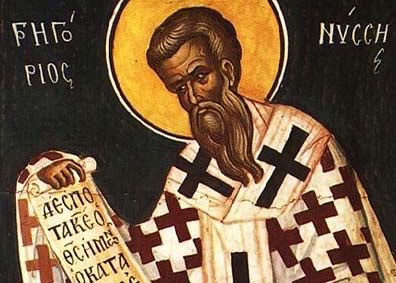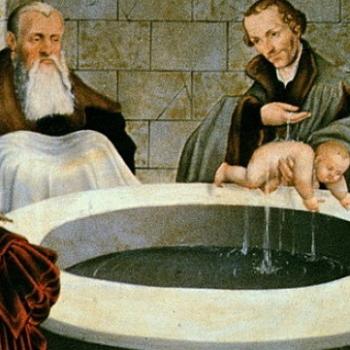
When I was in RCIA, one of the sticking worries I had was what the Church teaches about the salvation of infants who die without baptism. The reason this was a worry for me is the fact that my daughter, Caitlyn’s, having been stillborn precluded all possibility of baptism. Even had I been Catholic at the time (and I wasn’t), the dead are not eligible for baptism.
So when we had our session on baptism, and our team leader stressed the Church’s teaching about the necessity of baptism for salvation, and thus the practice of baptising infants, I decided to approach her during break and ask what the Church would say about Caitlyn. Is she in Heaven? Now, in the providence of God, it happened that P.—a true woman of grace—had lost her own granddaughter to a stillbirth not too many years before. She reaffirmed for me a truth that Fr. George was often at pains to stress: God is not limited by the sacraments. She told me about the baptism of desire, and that certainly I would have had Caitlyn baptized.
“So the waters of birth,” she said, “were Caitlyn’s baptismal waters.”
Thus it gave me great comfort to be able to visualize that, when Caitlyn was born, Jesus was there, and He baptized her.
I.
Normally I would not criticize the blog of another Catholic. But in this case, I decided to go ahead and publish this post, not merely because the subject of Limbo happened to come up in this article on the Traditionalist, Dallas-area blog Veneremur Cernui, but because it also happened to be published on April 18, which is Caitlyn’s birthday as well as the day I published my memoir about her here.
The post begins with a quotation from St. Gregory of Nyssa’s On Infants’ Early Deaths, in which Gregory speculates on the reason why God permits such painful events to happen.
It is reasonable … to expect that He Who knows the future equally with the past should check the advance of an infant to complete maturity, in order that the evil may not be developed which His foreknowledge has detected in his future life, and in order that a lifetime granted to one whose evil dispositions will be lifelong may not become the actual material for his vice. … [T]his, we suspect, is the cause of the deaths of new-born infants. He Who does all things upon a Plan withdraws the materials for evil in His love to the individual, and, to a character whose marks His Foreknowledge has read, grants no time, to display by a pre-eminence in actual vice what it is when its propensity to evil gets free play.
The author of the blog article says, “I don’t know if people will find it comforting, or capricious, or what, but it’s an interesting thought.” Frankly, I can’t imagine it being very comforting to imagine that my daughter would have grown up to “indulge a propensity to evil.” I don’t exactly find it capricious, though I do find it strikingly dumb; no disrespect intended to a saint and a Church Father, but he is not the infallible Magisterium. Gregory rather begs the question why it is that God didn’t take Ted Bundy or Osama bin Laden as an infant. He begs the question why God doesn’t just prevent evil altogether by taking us all in the first breath of our life. If Gregory is right, why these children, and not those? He raises more questions than he answers about the death of infants. “Our Reason in this matter,” he admits, “has to grope in the dark”; and indeed, little is more evident than that Gregory is groping in the dark throughout the entire work.
The author of the blog article is uncomfortable too, but for different reasons; namely, that pro-choicers could use Gregory’s words as a (hypocritical) argument for abortion: Look at all the evil you’d be sparing the world just by killing your baby and sending him or her off to Heaven. It’s true that that’s what Gregory’s words, taken to their logical conclusion, might lead to, but pay attention to what follows in the blog article.
[The pro aborts start] with an error—that babies that die very young, before baptism, or in utero, go to Heaven. … Catholics believe that such children, who have committed no sin of their own but have also not been baptized, go to limbo, a place of perfect natural happiness that is technically part of hell but where there is no suffering.
II.
In charity: That is not true. The author attempts to soften these words by saying, “Officially, this is not doctrine [and] not a required belief,” but that honestly strikes me as a poor qualification when the earlier statement characterizes Limbo as what “Catholics believe,” as if this were official teaching and dogma that was universally accepted.
The fact is, not only does the Catholic Church not teach any belief in Limbo today, but it never did. That this is true is the assertion of no less an authority than Pope Benedict XVI (when he was still Cardinal Ratzinger). Quoted by Jimmy Akin here, this is what Cardinal Ratzinger says:
Limbo was never a defined truth of the faith [and] I would abandon it since it was only a theological hypothesis. It formed part of a secondary thesis in support of a truth which is absolutely of first significance for the faith, namely, the importance of baptism. [Note carefully here, because this is important.] [T]he very theologians who proposed “limbo” also said that parents could spare the child limbo by desiring its baptism through prayer.
In the combox of the Veneremur Cernui article, “Dismas” suggests that to say aborted souls go to Heaven is “warped Catholicism.” Although (as will be clearer below) one cannot know with infallible certainty that any soul is in Heaven, with respect to aborted babies, or stillborns, one can indeed have the assurance of faith and hope that they are with the Lord. Since Benedict XVI’s words make this clear, to use the characterization “warped” strikes me as deeply problematic.
Indeed, if “Limbo was never a defined truth of the faith,” in the words of Cardinal Ratzinger himself, it is hardly accurate to refer to it, as the author of the article does, as what “Catholics believe.”
So where did the idea of Limbo come from? The article by Mr. Akin I linked to above goes into great detail on this point, but the gist of it is that it arose as a hypothesis of medieval theologians, which may be stated in the form of the following syllogism:
1. Baptism, as Christ taught (John 3:5), is necessary for salvation.
2. There are, however, infants who die without having received the sacrament of baptism.
3. Hell is only for unrepentant sinners.
4. Purgatory is only for the baptized who are ultimately destined for Heaven.
5. Therefore, there must be a fourth state for infants who die without the sacrament of baptism, and this we call Limbo.
However, as Cardinal Ratzinger pointed out, the Church never gave its Magisterial approval to this as a divinely-revealed dogma, and even those theologians who posited a Limbo (St. Augustine; Peter Abelard) affirmed the reality of the baptism of desire.
III.
On April 22, 2007—ironically, nearly a year to the date after Caitlyn was buried—the Church issued a final report, originally commissioned by Pope John Paul II, on this question. Entitled “The Hope of Salvation for Infants Who Die Without Baptism,” here is part of what it said:
[M]any factors … give serious theological and liturgical grounds for hope that unbaptized infants who die will be saved and enjoy the beatific vision. We emphasize that these are reasons for prayerful hope, rather than grounds for sure knowledge. There is much that simply has not been revealed to us. … What has been revealed [N.B.] is that the ordinary way of salvation is by the sacrament of baptism. … [But we have] strong grounds for hope that God will save infants when we have not been able to do for them what we would have wished to do, namely, to baptize them into the faith and life of the Church.
Indeed these words echo the Catechism of the Catholic Church, par. 1261.
As regards children who have died without Baptism, the Church can only entrust them to the mercy of God, as she does in her funeral rites for them. Indeed, the great mercy of God who desires that all men shall be saved, and Jesus’ tenderness toward children which caused Him to say: “Let the children come to me, do not hinder them,” allow us to hope that there is a way of salvation for children who have died without Baptism.
God made the sacraments for man, not man for the sacraments. They are the ordinary means of salvation, and no one should believe that the sacrament of baptism can be put off because God is merciful. But some people—stillborn infants, or infants who die by abortion—simply have no opportunity, through no fault of their own, to receive them. God is not going to send infants to some hypothetical Limbo because of a technicality. God instituted the sacraments, but the sacraments do not bind his hands.
That is not “warped Catholicism.” It is the teaching of John Paul II (cf. Evangelium Vitae 99, the future Pope Benedict XVI, and the Catechism of the Catholic Church. The Catechism is “what Catholics believe.”
St. Caitlyn Elisabeth Alt, pray for us.
POSTSCRIPT
An earlier version of this article suggested that “Dismas” (one of the commenters on the Veneremur Cernui article) held to a belief in Limbo, and uncharitably stated that Dismas felt himself “more Catholic than the pope.” After an exchange in the comment section on the other blog, I have rewritten that paragraph to (I hope) more faithfully represent what Dismas meant by the comment.
Dismas’s real concern seems to be that a statement that aborted babies are definitely in Heaven is inimical to efforts to curb abortion. That is a legitimate concern, though one that I think is unfounded for two reasons. The first is that, if a woman is considering an abortion but concedes that the eternal destiny of her child’s soul is a real matter, then she already accepts the humanity of the unborn child and can be persuaded not to have the abortion on moral grounds alone.
The second is that many women who have had abortions later regret it, are deeply wounded, and are in repentance and seeking forgiveness. They are most understandably concerned about where their child is and whether there is hope for eventual reunion in Heaven. Speaking personally, the same is true for parents who have lost their child to a stillbirth. Although I concede that there is no divine revelation on this point, I also put a great deal of trust in the mercy of God and in the statements the Church has made about the baptism of desire and the “serious theological and liturgical grounds for hope.”
These points can be used to comfort mothers who are in repentance, and Pope John Paul II says as much, when addressing mothers who have had abortions, in paragraph 99 of Evangelium Vitae. The fact that the Church’s report from 2007 used the expression “serious theological and liturgical grounds for hope” implies that this is not merely a matter of pastoral sympathy. And even taking pastoral sympathy into consideration, if men can have that love and concern for grieving parents, how much greater is the love and mercy of God Himself?
In any case, I hope that Dismas will forgive my earlier uncharitable expressions, which were the product of of my own understandable passion on this subject.
***
If you like the content on this blog, your generous gift to the author helps to keep it active. I remember all my supporters in my Mass intentions each week.
















